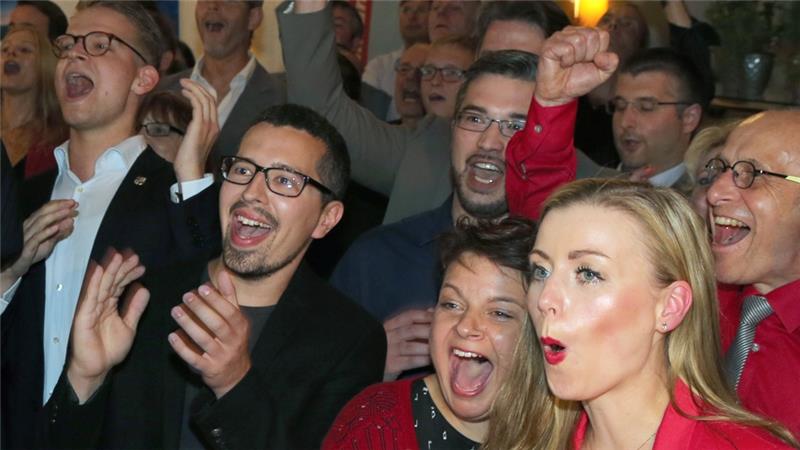-
Tips for becoming a good boxer - November 6, 2020
-
7 expert tips for making your hens night a memorable one - November 6, 2020
-
5 reasons to host your Christmas party on a cruise boat - November 6, 2020
-
What to do when you’re charged with a crime - November 6, 2020
-
Should you get one or multiple dogs? Here’s all you need to know - November 3, 2020
-
A Guide: How to Build Your Very Own Magic Mirror - February 14, 2019
-
Our Top Inspirational Baseball Stars - November 24, 2018
-
Five Tech Tools That Will Help You Turn Your Blog into a Business - November 24, 2018
-
How to Indulge on Vacation without Expanding Your Waist - November 9, 2018
-
5 Strategies for Businesses to Appeal to Today’s Increasingly Mobile-Crazed Customers - November 9, 2018
Nationalists Overtake Merkel Party in German State Vote
Top candidate Leif-Erik Holm, Alexander Gauland and Beatrix von Storch of the anti-immigration party Alternative for Germany (AfD) react after first exit polls during the Mecklenburg-Vorpommern state election at the party post election venue in Schwerin, Germany, on September 4, 2016.
Advertisement
Merkel has not yet announced if she will run for a fourth term in office next autumn due to pressure from the sister party of her CDU, the Bavarian CSU, according to Der Spiegel magazine.
In the sprawling farming and coastal state of Mecklenburg-Vorpommern – Germany’s poorest and least populous – the issue of refugees and integration had become the deciding factor for one in three voters.
The significant issues of integration and the deportation of failed asylum seekers were mentioned by Ms. Merkel who has turned more hard line on the migrant crisis in recent weeks claiming that she does not want to see a repeat of a year ago.
This result, and the strong performance of AfD, is bitter for many, for everyone in our party, said Peter Tauber, her Christian Democrats general secretary.
Mecklenburg-Western Pomerania, an economically weak region in Germany’s northeastern corner, is home to 1.6 million of the country’s 80 million people and is a relative political lightweight.
“Of course this has something to do with refugee policy”, Merkel told reporters.
“This was more than a small state election, it was a vote on Merkel”, said news site Spiegel Online, pointing at the “protest storm” in “Merkel’s living room”.
Chancellor Merkel is perceived to be paying a dear price for her welcoming policy towards refugees, with Germany opening its doors to 1.1 million asylum seekers in 2015.
Majority have already made a decision to abandon the state, preferring to head “where there are jobs, people and shops”, said Frieder Weinhold, CDU candidate.
Following a spate of sexual assaults blamed on North African men on New Year’s Eve in Germany and a series of a bloody attacks this summer, some of which were claimed by the Daesh terrorist group, the mood of most Germans has darkened, with concerns growing stronger about how to integrate the newcomers.
The election was technically won by her coalition partners, the Social Democrats (SPD), who came first with around 30 per cent of the vote.
Yet this would mean that the AfD, which was founded in 2013 as an anti-euro party before morphing into a xenophobic party, would enter yet another regional parliament.
“Merkel’s catastrophic refugee policy always plays a role”, AfD’s co-chairwoman Frauke Petry told broadcaster ZDF.
Mecklenburg-West Pomerania, in the former East Germany, is where the chancellor’s own constituency is located.
“The key is that we must bring about more security, not just domestic security or protection from crime and terrorism, but also social security”, he said, after the results.
Advertisement
The far-left Left Party won 12.5 per cent, down from 18.4 per cent five years ago, while the pro-environment Greens won 5 per cent, down from 8.7 per cent.





























